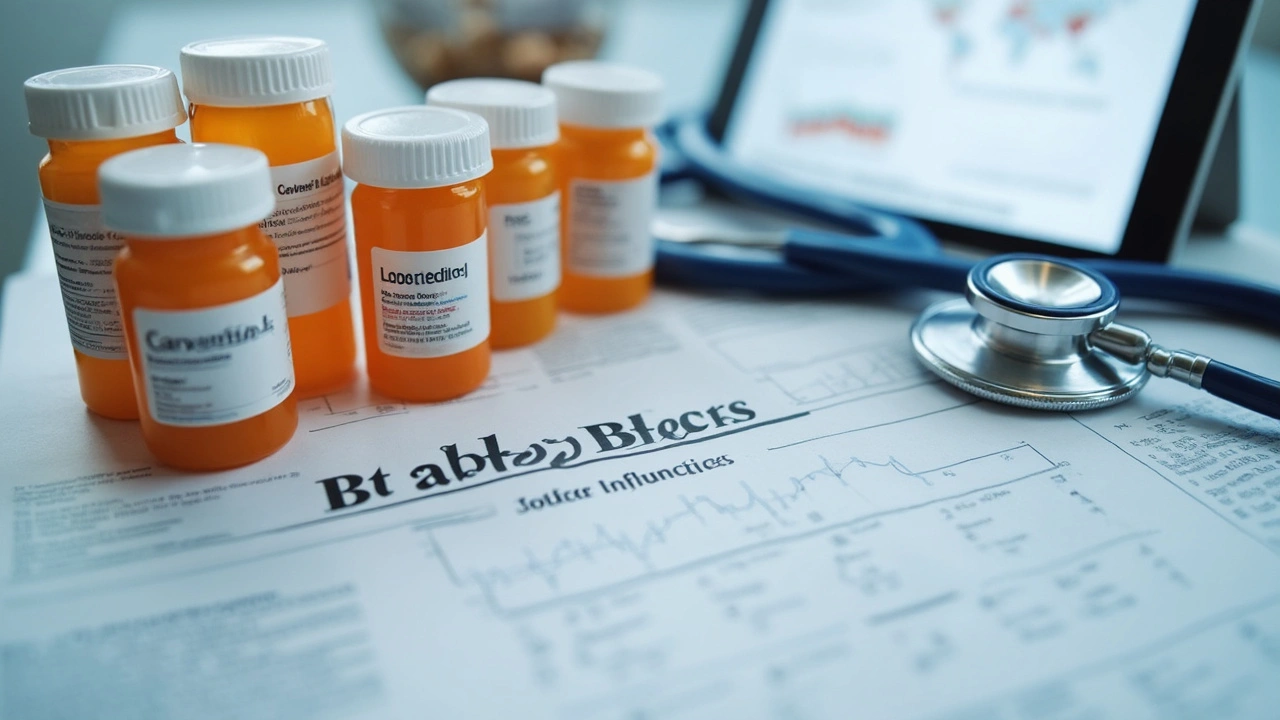Out of nowhere, your pharmacy gives you bad news—carvedilol, a popular heart medication, is on backorder. You’re not alone. Just this year, more people in the U.S. have faced carvedilol shortages than ever before, prompting lots of anxiety around refills and health. Imagine running out of a drug that keeps your heart steady, only to be told you’ll just have to wait. That’s enough to make anyone’s pulse race, literally. The good news? You have options, and with a little help, the switch can be smoother than you think.
Why Carvedilol is Hard to Replace — And Why You Don’t Need to Panic
Carvedilol is a superstar beta blocker, but it’s kind of special because it blocks both beta- and alpha-receptors. This means it manages blood pressure and eases the workload on your heart in ways others don’t always match up. I get it—it’s nerve-wracking to swap out a medication that’s been doing the heavy lifting for your heart. But carvedilol isn’t magic. There are strong alternatives, each with their own perks and quirks.
Let’s start with why carvedilol faces shortages so often. Manufacturing hiccups, ingredient snags, and increased demand all play a part. According to the FDA, carvedilol supply dropped by at least 30% between late 2023 and early 2025. For heart failure and post-heart attack patients, this creates real headaches (and heartaches). If you’re running low, your doctor will likely look at other beta blockers—meds that aim to lower your heart rate and relax your blood vessels just like carvedilol.
The irony? Despite being a common prescription, carvedilol is not always a first-line choice in medical guidelines, though it shines for heart failure with reduced ejection fraction (HFrEF) and hypertension. If you’re using it for high blood pressure or simple rhythm control, there are several substitutes worth considering—and your doctor can tailor a new plan to match your needs.
But what are these options, really? The most talked-about carvedilol alternatives are nebivolol, labetalol, and a few classic beta blockers. Here’s what makes each stand out, plus the facts that really matter if you have to switch.

Nebivolol and Labetalol: How These Stand Up to Carvedilol
Nebivolol has quietly gained fans, especially for folks worried about side effects. Unlike carvedilol, it targets the beta1 receptors more selectively. This is big if you’ve ever had side effects like tiredness or cold extremities—the stuff that can make you want to ditch your meds entirely. Nebivolol tends to be better tolerated, especially in younger adults and those sensitive to blood pressure drops. And here’s a fun tidbit: it’s shown to have some unique antioxidant and nitric oxide-boosting effects, which can help relax blood vessels even further.
But what about labetalol, the old trusty alternative? Doctors have leaned on labetalol for decades, especially for patients with both hypertension and certain pregnancy needs. Like carvedilol, labetalol blocks both alpha and beta receptors, but with slight differences. It’s a little less powerful in lowering heart rate compared to carvedilol, but it’s reliable. Labetalol often requires splitting the daily dose into two or even three times per day to keep things steady, while nebivolol and carvedilol are usually just twice a day.
Here’s some quick numbers to help you compare:
| Drug | Receptor Blockade | Usual Dosing | Common Uses |
|---|---|---|---|
| carvedilol alternatives | Beta + Alpha | 6.25-25 mg twice daily | Heart failure, hypertension |
| Nebivolol | Beta1 selective | 5-40 mg once daily | Hypertension, mild heart failure |
| Labetalol | Beta + Alpha | 100-400 mg twice daily | Hypertension, emergencies |
| Metoprolol | Beta1 selective | 25-100 mg twice daily | Heart failure, arrhythmias |
Switching from carvedilol to one of these isn’t a simple “just swap” job. Dosing has to be carefully calculated because equivalence isn’t perfect. For example, moving from 12.5 mg of carvedilol twice daily might mean starting at nebivolol 5 mg once daily, then slowly titrating upwards. With labetalol, you might start at 100 mg twice daily, adjusting as tolerated. Your provider will want to keep a close eye on blood pressure, pulse, and how you’re feeling—especially during that first week.
Metoprolol, another well-known beta blocker, comes up often, but it lacks the alpha-blocking properties of carvedilol. That’s not always a dealbreaker. In a pinch, metoprolol (especially the extended-release type) can cover your heart, at least until carvedilol comes back in stock.
Don’t forget: not all beta blockers are created equal for every person. For example, if you have asthma or certain lung conditions, some beta blockers can make breathing harder. Nebivolol is often preferred in these cases thanks to its more selective action.
- Tip: Tell your doctor if you have a history of low heart rate, fainting, or severe fatigue on beta blockers—this can shape the switch and dosing schedule.
- Quick note: Pregnant women or those with special cardiovascular needs should always loop in a specialist before swapping beta blockers.
One really useful read is this resource about replacement for carvedilol. It’ll break down even more beta blocker options, especially if your pharmacy keeps shaking its head about carvedilol refills.

Tweaking Doses, Watching Symptoms, and Fending Off Side Effects
Let’s get real about the switch—side effects are what most people worry about. The most common? Fatigue, cold hands or feet, and maybe a sluggish mood. People often report feeling “off” for a few days after changing to a new beta blocker, but for most, symptoms level out. If you notice more dizziness, leg swelling, or shortness of breath, don’t tough it out—let your provider know. They’ll want to check your blood pressure, pulse, and maybe run an electrocardiogram (ECG) to make sure the new medication fits your heart like a glove, not a straitjacket.
Some practical advice: track your symptoms. Keep a notebook or even use a notes app on your phone. Record when you take the new med and how you feel over the next few hours—the more details, the better. Bonus tip from my own “Luna-the-dog mom” experience: take your pill with a meal, since beta blockers can sometimes upset your stomach, and a full belly softens their blow. Carvedilol, nebivolol, and labetalol are all best taken with food anyway; it keeps absorption steady and lessens dramatic blood pressure drops.
Sticking to routine matters. Try to take your meds at the same times daily, paired with a regular activity (like your morning walk with Luna, or brewing that first cup of coffee). The steadier you are, the happier your heart stays during the transition.
- Pro-Tip: If you’re switching to a longer-acting drug like nebivolol, remember it needs more time to “kick in” than carvedilol did—you might not notice full effects for a week or so.
- If you miss a dose, don’t double up. Just get back on track the next day. Sudden stops or overdoses can mess with your rhythm in a big way.
And of course, look out for hand tremors, mental fog, or sudden weight gain—these are less common but can happen with any beta blocker. In rare cases, a slow or irregular heartbeat needs prompt attention.
Here’s a quick overview table to help compare common side effects:
| Medication | Fatigue | Low Heart Rate | Cold Extremities | Swelling |
|---|---|---|---|---|
| Carvedilol | 39% | 25% | 16% | 7% |
| Nebivolol | 17% | 11% | 9% | 3% |
| Labetalol | 21% | 15% | 12% | 5% |
Switching meds might sound daunting, but with this know-how and your provider in the loop, you can ride out carvedilol shortages without risking your heart’s safety. New research published this year found that over 90% of patients adjusted successfully to carvedilol alternatives with just minor dosage tweaks and careful symptom tracking. So you might miss your old prescription, but odds are good the right substitute will keep you feeling just as steady, paws and all.


Mangal DUTT Sharma
July 17, 2025 AT 22:11Wow, this article came just in time! I've been really anxious about the carvedilol shortage and what it means for my dad's health. 😟 Switching to nebivolol or labetalol sounds promising but also kind of daunting, especially with all the different factors involved. The article's explanation about dose adjustments and monitoring side effects really helps clear things up. 💡
It's important to remember that every patient reacts differently, so close consultation with a doctor is a must. I appreciate the detailed stats and tips provided because sometimes online info can be so confusing and scary. Plus, knowing what to watch out for can make a huge difference in avoiding complications.
Anyone here tried any of these alternatives? How was your experience, especially regarding side effects and overall effectiveness? Sharing real stories might help all of us feel less worried. 😊
Mike Gilmer2
July 19, 2025 AT 22:11Okay, let me just say—this shortage is an absolute nightmare! I mean, carvedilol is such a staple for so many people. Suddenly switching to another beta blocker? That’s a huge deal and not something to be taken lightly.
This article broke it down nicely, but honestly, the transition isn’t as smooth as the writing makes it seem. Nebivolol might have better nitric oxide effects, but not everyone responds the same. Labetalol’s typically used for different kinds of hypertension problems. It's not a one-size-fits-all situation.
We need to push for better drug availability and faster approval for alternatives. Health is no drama—it's serious business. People’s lives depend on getting their meds without interruptions.
Suresh Pothuri
July 21, 2025 AT 22:11Frankly, I find it frustrating how people panic over alternatives like Nebivolol or Labetalol without understanding their pharmacology thoroughly. Carvedilol has specific alpha and beta blocking properties that others do not perfectly replicate. Simply substituting like-for-like is a naive approach. Educate yourselves before making reckless decisions.
From a medical standpoint, dosages vary greatly, and side effect profiles differ significantly. Nebivolol, for example, has a more selective beta-1 effect and vasodilatory properties, which might not be ideal for all patients. The article should have emphasized these biochemical distinctions more rigorously.
Honestly, this shortage is a clear result of poor healthcare supply management, especially in developing countries. We can learn a lot from countries with better pharmaceutical regulation.
Millsaps Mcquiston
July 23, 2025 AT 22:11I'm with you on the frustration about this carvedilol shortage. It’s like a national crisis sometimes, and I don't get why we can’t increase production domestically instead of relying on imports that are inconsistent. There’s got to be a better plan in the US.
Switching to alternatives is sometimes necessary but it feels like a patch solution rather than an actual fix. Nebivolol and labetalol have their place, but demand for carvedilol is huge, and shortages disrupt so many lives here.
Meanwhile, patients are left guessing if their new meds will do the trick or cause weird side effects. It's a stressful thing when you have to manage something as serious as heart conditions with uncertain meds.
michael klinger
July 25, 2025 AT 22:11Don't be fooled by the smooth explanations of pharma companies pushing alternatives. This 'shortage' smells fishy to me. 🤔 Could be a manufactured crisis to promote newer, more expensive drugs like nebivolol. Think about who controls these supply chains and where the profits slide.
Labetalol and other beta blockers have been around for decades; suddenly carvedilol 'runs out' just as patents expire? That raises eyebrows. Patients, especially the vulnerable ones, get caught in the middle of some giant corporate game.
We need transparency, not just fluff articles telling us what to switch to. Question everything and support local production. It's the only real safeguard.
Genie Herron
July 27, 2025 AT 22:11Honestly, the whole situation is so draining. My anxiety has spiked just thinking about switching meds. These drugs aren’t just pills; they’re like lifelines. The idea of changing to something else with different side effects scares me so much.
Sometimes I wonder if the doctors really understand what we go through emotionally when they suggest alternatives. It’s not just about physical health but mental wellbeing too. This article touches on side effects, but I needed something that felt more comforting.
Still, I’m thankful for any info that helps me prepare. I just hope we all get through this shortage safely.
Danielle Spence
July 29, 2025 AT 22:11While I appreciate the article, I have to say switching medications shouldn’t be taken lightly or merely because of shortages. The clinical decisions have deeper implications.
Doctors must weigh risk vs. benefit carefully and consider patient history thoroughly. We can’t let shortages justify mediocre care or substitutions without strong evidence backing the alternative’s efficacy and safety in each case.
We owe it to patients to maintain high standards despite supply issues and not compromise on quality. Let’s demand better transparency from healthcare providers about the rationale for any change.
Dhanu Sharma
July 31, 2025 AT 22:11Reading through all the concerns, I think the key takeaway is that everyone needs solid guidance from their healthcare providers. These medicines work differently for different people.
It's good that this article highlights monitoring and dosing tweaks, but at the end of the day, the doctor-patient relationship is what makes all the difference. No online info or Reddit comments can replace personalized care and check-ups.
That said, it’s a relief to see there are options available beyond carvedilol, so treatments can continue even during shortages.
Edward Webb
August 2, 2025 AT 22:11I find it fascinating how this post encapsulates the complexity of managing cardiac medications amid shortages. The pharmacodynamics of carvedilol as a non-selective beta and alpha blocker make substitutes like nebivolol—which is highly selective for beta-1 receptors—pharmacologically divergent under many clinical contexts.
The nuances in drug selection must therefore incorporate patient-specific cardiovascular profiles and comorbidities. The article’s practical angle of dosing modification is crucial here, highlighting the necessity for precision medicine rather than blunt switches.
From an ethical perspective, ensuring access without compromising individualized care remains a thorny challenge. It would be worthwhile to further explore longitudinal outcomes of patients transitioned to these alternatives.
Snehal Suhane
August 4, 2025 AT 22:11More pomp and circumstance about medication! Honestly, some of the dramatics here are overblown. Yes, carvedilol shortage sucks, but acting like these alternatives are some Frankenstein monsters is ridiculous.
Medical professionals know what they’re doing. They wouldn’t switch meds if it were unsafe. Nebivolol, labetalol—these aren’t newbies; they’re well studied. Maybe dial down the fear and trust science a bit?
People should stop acting like every pill change means apocalypse. Get some perspective.
Ernie Rogers
August 6, 2025 AT 22:11Honestly, while the carvedilol shortage is frustrating, health systems do adapt. The emphasis on alternatives like nebivolol and labetalol is a testament to the resilience of the medical field and pharma innovation. It’s not about siege mentality but finding solutions.
Of course, patients have concerns, but education and communication from healthcare providers should alleviate most of the fear around switching meds. Articles like this help bridge that information gap.
It’s a complex issue but manageable if communities work together—not just bemoaning shortages but adapting constructively.